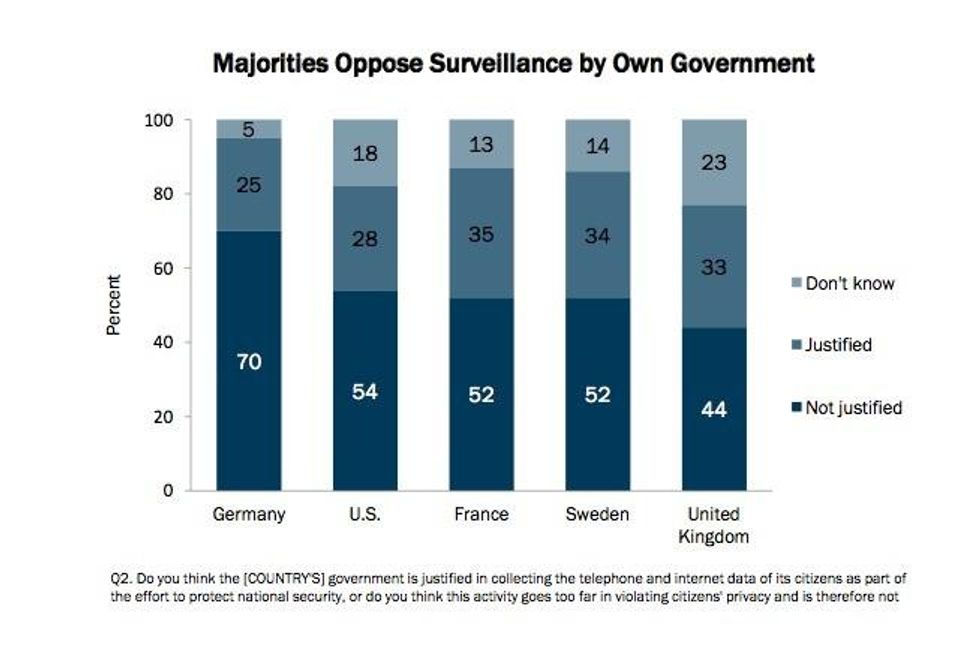Nov 12, 2013

According to a survey, conducted by the U.S.-based think-tank the German Marshall Fund of the United States, far more citizens disapprove of the dragnet spying techniques of their governments than those that approve--with the most overwhelming figures coming from Germany.
In response to the question "Do you think the [own country] government is justified in collecting the telephone and internet data of its citizens as part of the effort to protect national security, or do you think this activity goes too far in violating citizens' privacy and is therefore not justified?" 70 percent of Germans said their government is not justified. Only twenty-five percent disagreed.
And, as Reutersreports, "Germans were even more hostile to governments collecting the telephone and internet data of people from allied countries, with 72 percent opposed and 20 percent in favor."
Meanwhile, 54 percent of those polled in the U.S. said the U.S. government should not spy on its own citizens. And 44 percent opposed spying on the citizens of allied countries with 33 percent saying it was justified.
Similar numbers came from the U.K.. Forty-four percent said their government's spying agency, the GCHQ, is not justified in spying on U.K. citizens, while 33 percent did not. Forty-three percent said their government shouldn't spy on allied citizens.
Similar results emerged from Sweden and France, where a majority polled in favor of curbing unchecked spying at home and around the world.
However, the U.S. shows no signs of slowing down its dragnet surveillance policies, despite ongoing domestic and international uproar. As the New York Times reported last week, after more than six months of NSA revelations showing the vast reach of the spying agency, "President Obama and his top advisers have concluded that there is no workable alternative to the bulk collection of huge quantities of 'metadata,' including records of all telephone calls made inside the United States."

_____________________
Why Your Ongoing Support Is Essential
Donald Trump’s attacks on democracy, justice, and a free press are escalating — putting everything we stand for at risk. We believe a better world is possible, but we can’t get there without your support. Common Dreams stands apart. We answer only to you — our readers, activists, and changemakers — not to billionaires or corporations. Our independence allows us to cover the vital stories that others won’t, spotlighting movements for peace, equality, and human rights. Right now, our work faces unprecedented challenges. Misinformation is spreading, journalists are under attack, and financial pressures are mounting. As a reader-supported, nonprofit newsroom, your support is crucial to keep this journalism alive. Whatever you can give — $10, $25, or $100 — helps us stay strong and responsive when the world needs us most. Together, we’ll continue to build the independent, courageous journalism our movement relies on. Thank you for being part of this community. |
Our work is licensed under Creative Commons (CC BY-NC-ND 3.0). Feel free to republish and share widely.
Jacob Chamberlain
Jacob Chamberlain is a former staff writer for Common Dreams. His website is www.jacobpchamberlain.com.

According to a survey, conducted by the U.S.-based think-tank the German Marshall Fund of the United States, far more citizens disapprove of the dragnet spying techniques of their governments than those that approve--with the most overwhelming figures coming from Germany.
In response to the question "Do you think the [own country] government is justified in collecting the telephone and internet data of its citizens as part of the effort to protect national security, or do you think this activity goes too far in violating citizens' privacy and is therefore not justified?" 70 percent of Germans said their government is not justified. Only twenty-five percent disagreed.
And, as Reutersreports, "Germans were even more hostile to governments collecting the telephone and internet data of people from allied countries, with 72 percent opposed and 20 percent in favor."
Meanwhile, 54 percent of those polled in the U.S. said the U.S. government should not spy on its own citizens. And 44 percent opposed spying on the citizens of allied countries with 33 percent saying it was justified.
Similar numbers came from the U.K.. Forty-four percent said their government's spying agency, the GCHQ, is not justified in spying on U.K. citizens, while 33 percent did not. Forty-three percent said their government shouldn't spy on allied citizens.
Similar results emerged from Sweden and France, where a majority polled in favor of curbing unchecked spying at home and around the world.
However, the U.S. shows no signs of slowing down its dragnet surveillance policies, despite ongoing domestic and international uproar. As the New York Times reported last week, after more than six months of NSA revelations showing the vast reach of the spying agency, "President Obama and his top advisers have concluded that there is no workable alternative to the bulk collection of huge quantities of 'metadata,' including records of all telephone calls made inside the United States."

_____________________
Jacob Chamberlain
Jacob Chamberlain is a former staff writer for Common Dreams. His website is www.jacobpchamberlain.com.

According to a survey, conducted by the U.S.-based think-tank the German Marshall Fund of the United States, far more citizens disapprove of the dragnet spying techniques of their governments than those that approve--with the most overwhelming figures coming from Germany.
In response to the question "Do you think the [own country] government is justified in collecting the telephone and internet data of its citizens as part of the effort to protect national security, or do you think this activity goes too far in violating citizens' privacy and is therefore not justified?" 70 percent of Germans said their government is not justified. Only twenty-five percent disagreed.
And, as Reutersreports, "Germans were even more hostile to governments collecting the telephone and internet data of people from allied countries, with 72 percent opposed and 20 percent in favor."
Meanwhile, 54 percent of those polled in the U.S. said the U.S. government should not spy on its own citizens. And 44 percent opposed spying on the citizens of allied countries with 33 percent saying it was justified.
Similar numbers came from the U.K.. Forty-four percent said their government's spying agency, the GCHQ, is not justified in spying on U.K. citizens, while 33 percent did not. Forty-three percent said their government shouldn't spy on allied citizens.
Similar results emerged from Sweden and France, where a majority polled in favor of curbing unchecked spying at home and around the world.
However, the U.S. shows no signs of slowing down its dragnet surveillance policies, despite ongoing domestic and international uproar. As the New York Times reported last week, after more than six months of NSA revelations showing the vast reach of the spying agency, "President Obama and his top advisers have concluded that there is no workable alternative to the bulk collection of huge quantities of 'metadata,' including records of all telephone calls made inside the United States."

_____________________
We've had enough. The 1% own and operate the corporate media. They are doing everything they can to defend the status quo, squash dissent and protect the wealthy and the powerful. The Common Dreams media model is different. We cover the news that matters to the 99%. Our mission? To inform. To inspire. To ignite change for the common good. How? Nonprofit. Independent. Reader-supported. Free to read. Free to republish. Free to share. With no advertising. No paywalls. No selling of your data. Thousands of small donations fund our newsroom and allow us to continue publishing. Can you chip in? We can't do it without you. Thank you.